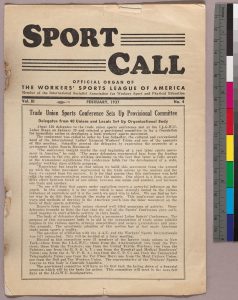by Greg Bond, Sports Archivist and Curator, Joyce Sports Research Collection
In honor of Labor Day, Rare Books and Special Collections is pleased to highlight three recently acquired 1937 issues of the scarce monthly publication Sport Call, The Official Organ of The Workers’ Sports League of America. Published during the 1930s, Sport Call’s tagline explained that it was “a periodical devoted to the physical education of the working class,” and it promoted healthful sports and recreation for laborers and workers.
During the turbulent years of the Great Depression, Sport Call and the Workers’ Sports League of America (WSLA) were active participants in national and international socialist movements. Headquartered in New York City, the League—through its official journal—offered a decidedly pro-labor view of sports and athletics that critiqued, what it saw as, capitalist exploitation of laborers and athletes. Sport Call also fervently opposed the rising tide of fascist politics during the 1930s and endorsed sports as a potential unifying and democratizing force.
Sport Call supported, for example, a January 1937 conference organized by the International Ladies Garment Workers Union (ILGWU) that aimed to establish a permanent Labor Sports Movement. Speaking to more than 150 delegates, Siegfried Lipschitz, President of the Workers’ Sports League, described the principles of Workers’ Sports International—the parent organization of the WSLA. “The Workers’ Sports International,” he said, “is a pillar of world democracy.”
A Jewish German emigré, lawyer, journalist, and activist, Lipschitz knew first hand the necessity of fighting reactionary politics: “The International and its affiliated organizations reject dictatorship in all its forms,” he declared. “To them it is an eternal creed that Labor cannot live and flourish,” Lipschitz concluded, “except in an atmosphere of free speech, free press, and the fullest expression of popular sentiments.” (March 1937, p. 3).
Sport Call well understood the connection between sports and politics, and an anti-fascist theme runs throughout these three issues. In February 1937, the journal editorialized strongly against the upcoming heavyweight championship fight between German Max Schmeling and American James Braddock. The editors wrote that they were “vehemently opposed to the spreading of Nazi propaganda in Sports!,” and they elaborated:
“The fact that Max Schmeling is a Nazi is known everywhere. The fact that Schmeling is a first-class propaganda merchant of Hitler’s is also well known. The opportunity to spread Nazi filth in this country must not be given to Hitler! The Braddock-Schmeling fight must not be staged!”
Similarly, the Workers’ Sports League had advocated for boycotting the 1936 Berlin Olympics in protest of Nazi Germany’s policies. The following year, the League supported and promoted the Third International Workers Olympiad held in Antwerp, Belgium, as an alternative and more egalitarian athletic competition.
In an editorial titled, “Forward to Antwerp,” the March 1937 issue of Sport Call endorsed the call to action of George Elvin, the General Secretary of the British Workers Sports Association. The purpose of the Workers Olympiad, Elvin said, was to promote: “The unity of the people against war; the determination to continue the fight for clean, healthy, and beneficial sport; the maintenance of liberty and democracy.”
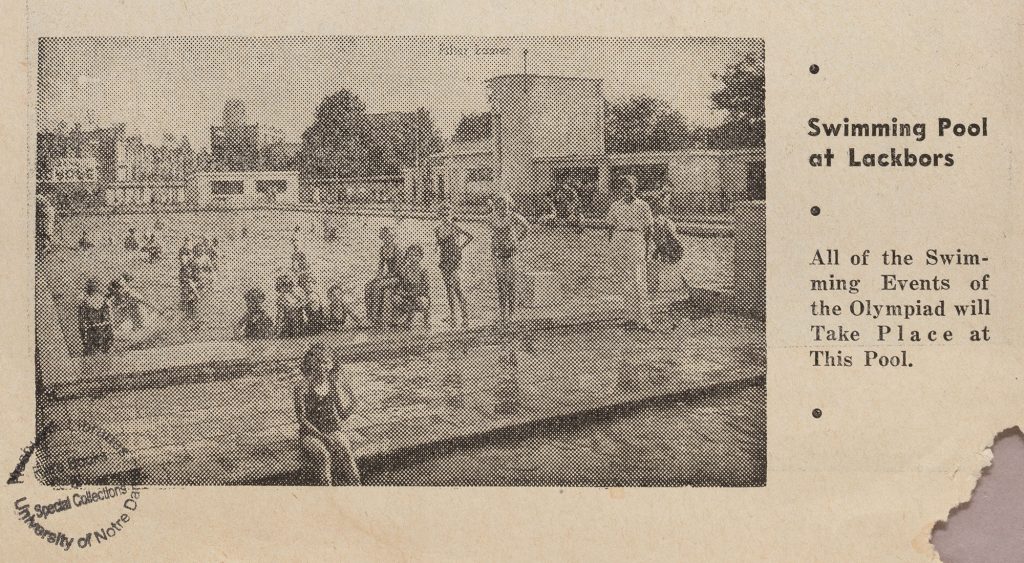
More specifically, Elvin elaborated that there will be “none of those regrettable incidents, which mar other sports meetings. Working class leaders will not refuse the hand-clasp of congratulations to victors as Hitler did to Jesse Owens, because he did not approve of the color of his skin.” (March 1937, page 1).
The Workers’ Sports League and Sport Call consistently participated in anti-fascist events around New York and sought to include sports programming in socialist and pro-labor gatherings. In February 1937, Wilhelm Sollmann, a German politician and a former Minister of Labor in Germany’s Weimar government, gave a lecture in New York City titled, “What After Hitler?” As part of the event, members of the Workers’ Sports League put on a sports exhibition.
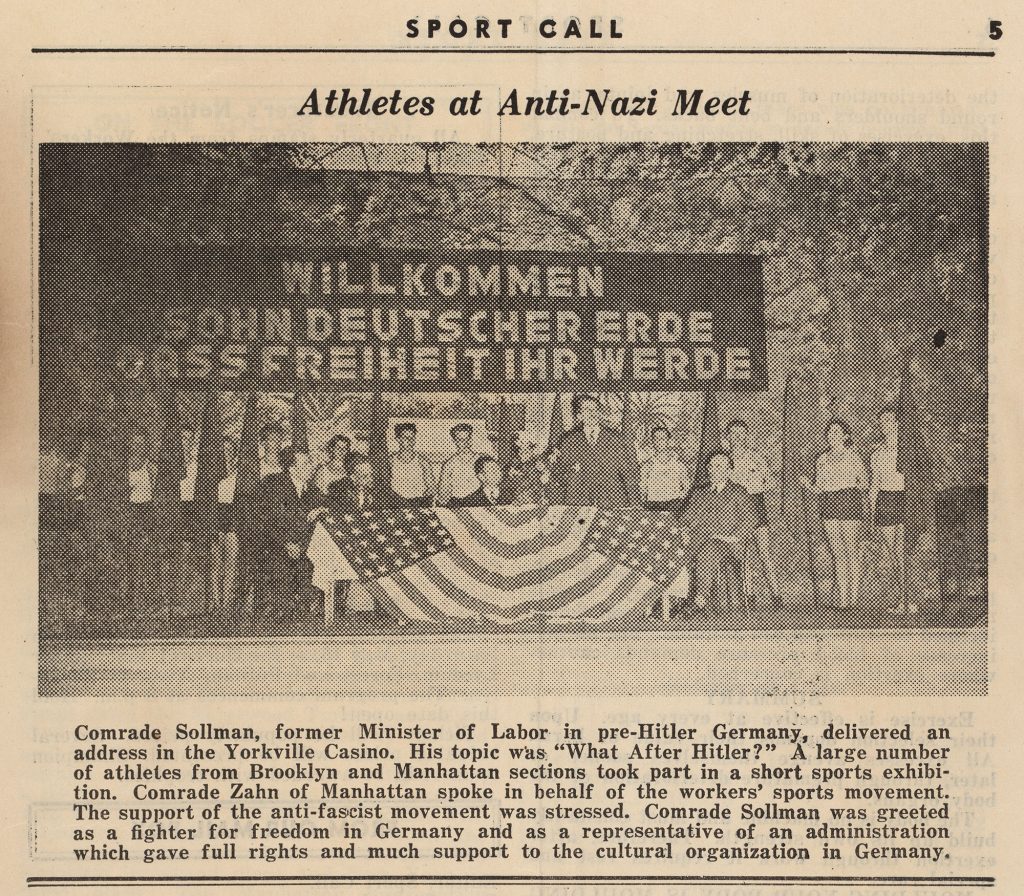
Sport Call also favorably covered the Second Annual World Labor Athletic Festival held on July 11, 1937, at New York City’s Randall Park. More than 20,000 “trade unionists and sports fans,” according to the journal, attended and participated in the meet. The cover of the July 1937 issue of Sport Call featured members of the Workers’ Sports League performing “their rhythmic calisthenic drill.”
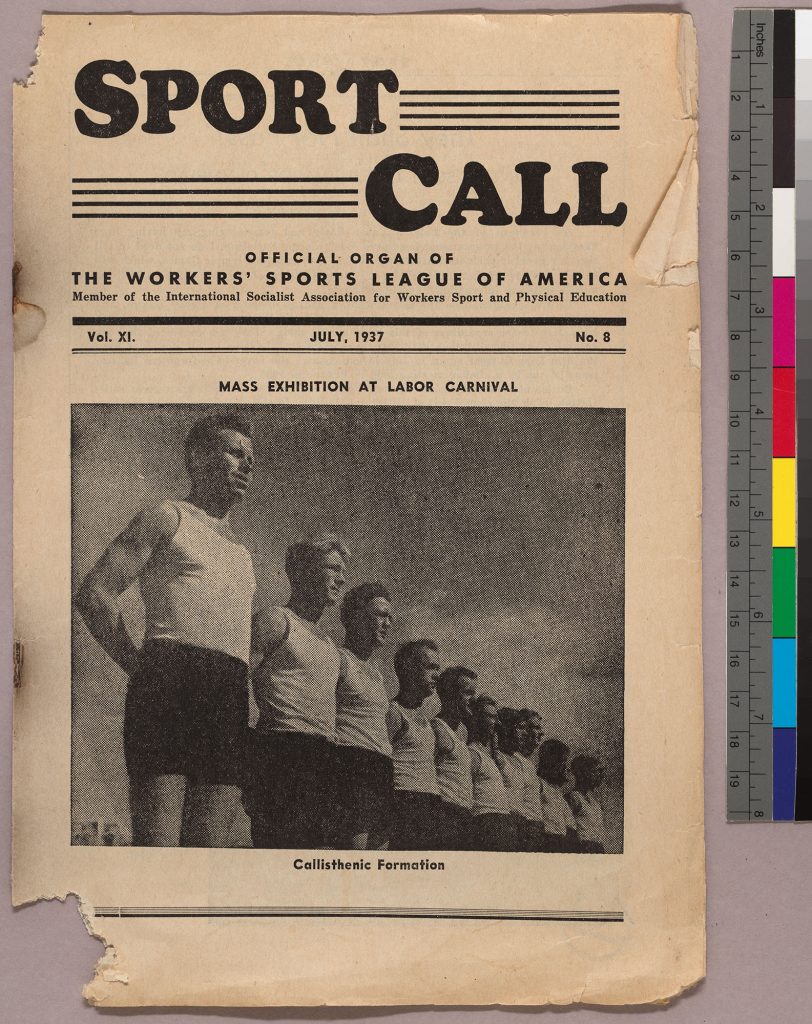
In addition to supporting national and international causes, the Workers’ Sports League also promoted the health benefits of recreation. Sport Call regularly printed health and recreation tips for readers and workers. In February 1937 (page 4), an article encouraged “Exercise in Winter” and featured a picture explaining, “It’s a lot fun and warmer than you think!”
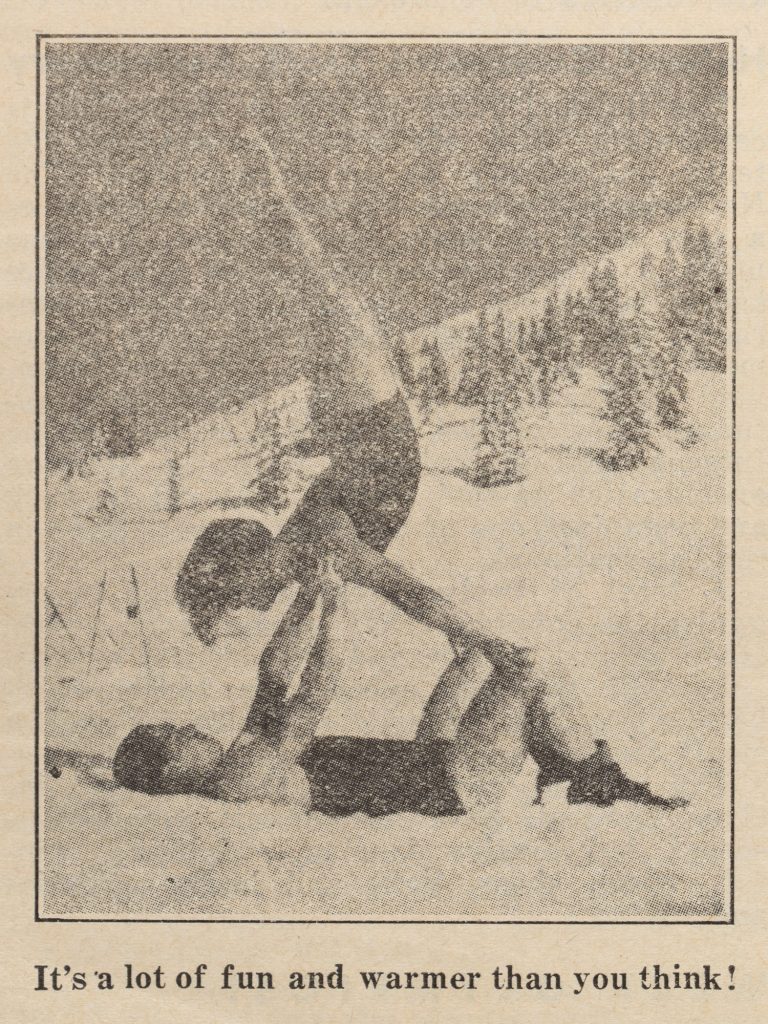
A letter to the editor of the March 1937 issue further discussed the importance of the participatory and egalitarian nature of labor sports organizations:
“The Workers’ Sports League, building upon its program of solidarity with the working class and its aspirations, physical development of the masses rather than individual “stars,” real amateurism rather than quasi-professionalism, equal welcome to all regardless of race and color, and democratic organization control, can be built into a mighty organization—and become itself the “official” sports movement.” (March 1937, page 6)
These Sport Call issues are available to researchers. RBSC welcomes new donations to expand our holdings of this scarce and important title.
Note about Sport Call publication history: This hard-to-find and relatively obscure journal is held by few repositories. It apparently began publication as the German-language Arbeiter-Sport in Amerika (Workers’ Sport in America) in about 1930. The journal changed titles to Proletarian Sports and adopted English in 1934, before changing titles again to Sport Call in about 1936.
RBSC is closed Monday, September 1st, for Labor Day.
Previous Labor Day Posts:
2024: Labor Day 2024 – Perspectives from the Catholic Pamphlet Collection
2023: Souvenirs from the Union Printers National Baseball League Tournament
2020: Labor and Linen — The Prints of William Hincks

